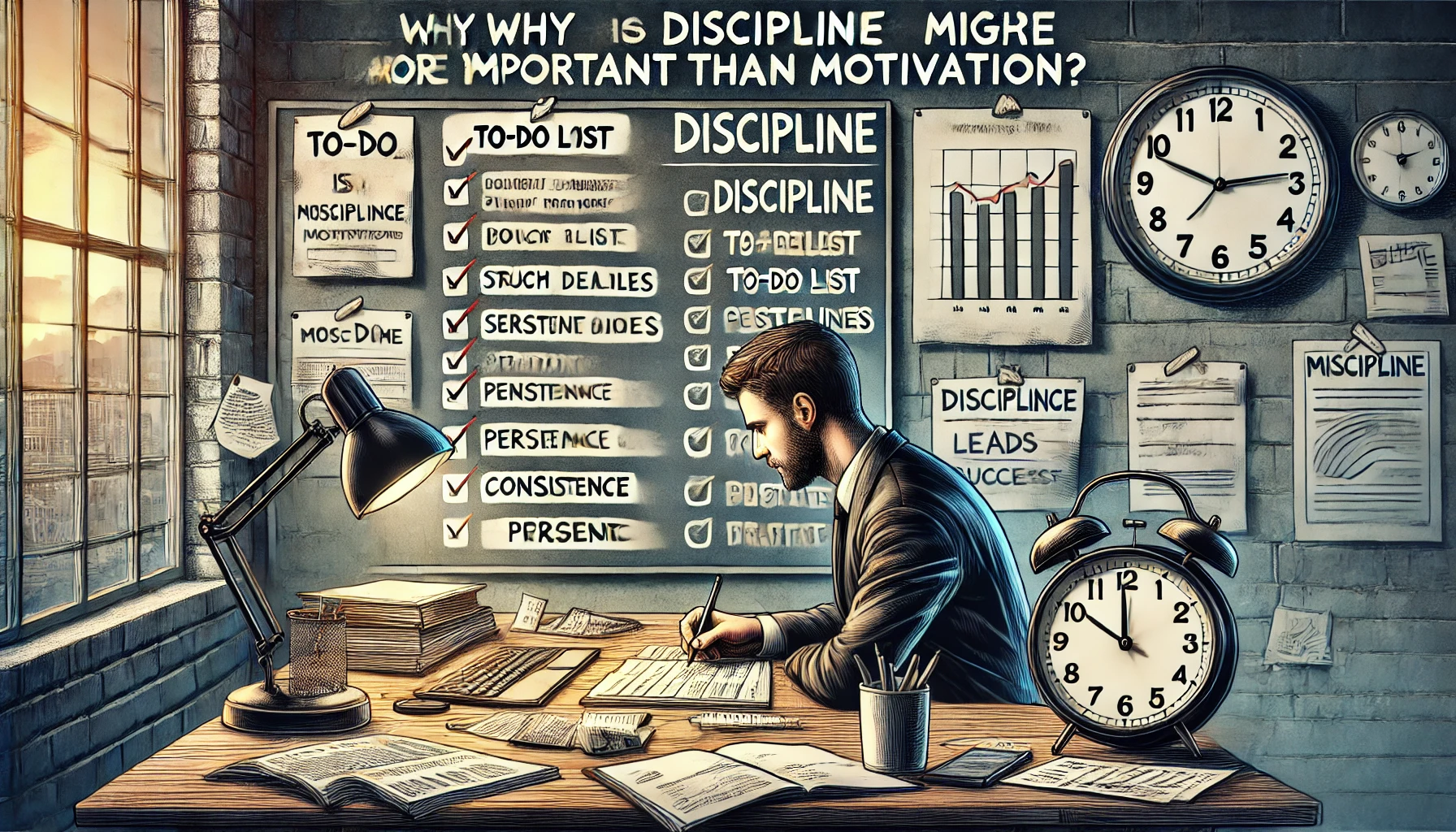Many people believe that motivation is the key to success. They wait for the right moment, the perfect inspiration, or an external push to take action. However, motivation is fleeting—it comes and goes. Discipline, on the other hand, is reliable and consistent. It ensures progress even when motivation is low.
This article explores the difference between motivation and discipline, why discipline is a stronger driver of success, and how you can develop it to achieve your long-term goals.
The Difference Between Motivation and Discipline
While both motivation and discipline play a role in success, they operate differently. Motivation is emotional and depends on external or internal inspiration. Discipline, however, is a habit—something you do regardless of how you feel.
| Motivation | Discipline |
|---|---|
| Based on feelings and emotions | Based on habits and systems |
| Temporary and inconsistent | Long-term and reliable |
| Requires inspiration | Functions without external triggers |
| Can disappear when challenges arise | Keeps you on track despite obstacles |
Think of motivation as a spark—it ignites action but burns out quickly. Discipline is the fuel that keeps the fire going long after motivation fades.
Why Motivation Alone is Not Enough
Relying on motivation is like waiting for the perfect weather to go outside—it’s unpredictable. The problem with motivation is that:
- It fluctuates—some days you feel inspired, others you don’t.
- It fades when things get hard—when challenges arise, motivation often disappears.
- It depends on external factors—a motivational speech might energize you temporarily, but it doesn’t build consistency.
This is why so many people start a new habit, like exercising or waking up early, but quit after a few days. They start with high motivation but lack the discipline to continue when motivation runs out.
How Discipline Leads to Long-Term Success
Discipline removes the need for constant motivation. Instead of relying on how you feel, discipline turns actions into habits. This leads to:
- Consistency – You take action daily, no matter what.
- Efficiency – You don’t waste time debating whether to do something.
- Growth – You build skills over time through repeated effort.
Examples of How Discipline Beats Motivation
| Situation | Motivation Response | Discipline Response |
|---|---|---|
| You don’t feel like working out | “I’ll skip today and do it tomorrow.” | “I go to the gym no matter what.” |
| You’re tired after work | “I’ll start that project later.” | “I do 30 minutes of focused work anyway.” |
| You don’t feel inspired to write | “I’ll wait for inspiration.” | “I write 500 words daily, no matter what.” |
When discipline takes over, your actions become automatic, leading to real progress.
How to Build Strong Discipline
Developing discipline isn’t about being naturally strong-willed—it’s about creating systems that make good habits easier to follow and bad habits harder to maintain.
1. Create a Routine and Stick to It
One of the best ways to build discipline is to have a structured routine. When you do something at the same time every day, it becomes second nature.
✅ Example of a Daily Routine for Discipline:
| Time | Activity |
|---|---|
| 6:30 AM | Wake up and exercise |
| 7:30 AM | Plan tasks for the day |
| 9:00 AM | Deep work (no distractions) |
| 12:00 PM | Break and lunch |
| 2:00 PM | Meetings or skill development |
| 6:00 PM | Wind down and read |
By sticking to a set schedule, your brain adapts, making discipline automatic.
2. Reduce Decision Fatigue
Making too many decisions throughout the day can drain your willpower. To stay disciplined, simplify your daily choices.
✅ How to Reduce Decision Fatigue:
| Problem | Solution |
|---|---|
| Deciding what to wear | Create a simple wardrobe (like Steve Jobs’ black turtleneck routine) |
| Choosing what to eat | Meal prep or have go-to meals |
| Planning when to work out | Exercise at the same time every day |
When you automate decisions, it’s easier to stay on track.
3. Set Clear Goals with Deadlines
Discipline thrives on specific goals. Instead of vague goals like “get in shape”, set measurable targets like:
✅ Examples of Clear Goals:
- “Exercise for 30 minutes every Monday, Wednesday, and Friday.”
- “Read 20 pages of a book every night before bed.”
- “Write 500 words per day for 30 days.”
A clear goal removes confusion and makes action more predictable.
4. Use the “Do It Anyway” Mindset
Highly disciplined people understand that action doesn’t require motivation. Instead of debating whether to do something, they simply do it anyway.
✅ How to Apply This Mindset:
- Don’t feel like working out? Go for 10 minutes—chances are you’ll keep going.
- Not in the mood to write? Write just one paragraph—momentum will take over.
- Too tired to study? Read for five minutes—small effort is better than none.
Discipline is about pushing through discomfort and building resilience.
5. Track Progress and Stay Accountable
Seeing progress reinforces discipline. Whether it’s a habit tracker, a journal, or an accountability partner, tracking progress keeps you committed.
✅ Ways to Track Discipline:
| Method | How It Helps |
|---|---|
| Habit tracker | Provides visual motivation |
| Journal | Reflect on what’s working |
| Accountability partner | Adds external motivation |
When you measure your progress, you stay focused on the bigger picture.
6. Make Discipline Easier by Eliminating Temptations
Bad habits make discipline harder. The more accessible distractions are, the harder it is to stay consistent.
✅ How to Remove Temptations:
| Distraction | How to Remove It |
|---|---|
| Social media | Use website blockers or put your phone in another room |
| Unhealthy food | Keep junk food out of the house |
| TV at night | Set a reading goal before allowing screen time |
When bad habits are less convenient, discipline becomes effortless.
Final Thought: Discipline Creates Freedom
Many people think discipline is restrictive, but in reality, discipline creates freedom. When you master discipline, you:
- Control your time instead of reacting to distractions.
- Achieve goals faster because you take action daily.
- Build confidence by proving to yourself that you can stay consistent.
Motivation is great when it’s there, but discipline ensures you keep going when it’s not. By creating a structured routine, reducing decision fatigue, and committing to small daily actions, you can make discipline a habit—and success inevitable.












Leave a Reply